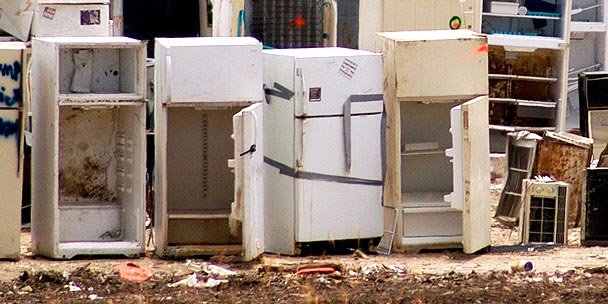Renovations are an exciting time to refresh your home’s look, improve functionality, and increase the value of your property. However, they also come with the challenge of properly disposing of old appliances. Whether you’re upgrading your kitchen or modernizing your laundry room, old appliances can be cumbersome to handle. Proper disposal is not only necessary for safety but also for environmental responsibility. Below, we outline the best methods to dispose of old appliances during renovations.
Why Proper Appliance Disposal Matters
Before we dive into the specific steps, it’s essential to understand the importance of proper disposal. Appliances contain materials that can be harmful to the environment if not handled correctly. Items like refrigerators and air conditioners may contain refrigerants that can damage the ozone layer, while other appliances have parts made of plastic, metal, and hazardous substances like lead and mercury. Disposing of these appliances improperly can lead to soil and water contamination, illegal dumping penalties, and contribute to landfill overcrowding.
Environmentally-Friendly Disposal Methods
- Recycling Appliances One of the most responsible ways to dispose of old appliances is by recycling them. Most appliances, including refrigerators, ovens, and washing machines, are made of materials that can be repurposed. Metals like steel, aluminum, and copper can be extracted and reused, while plastic components can be melted down and repurposed for new products.
Many cities and municipalities offer appliance recycling programs where you can drop off your old machines for proper disposal. These facilities ensure that any harmful materials, like refrigerants, are safely removed, and the rest of the appliance is processed for recycling.
- Donate Functional Appliances If your old appliance is still in working condition, consider donating it to charity. Many organizations, such as Habitat for Humanity and local shelters, accept used but functional appliances. These items can help families in need, and as a bonus, your donation may be tax-deductible.
- Manufacturer or Retailer Take-Back Programs Many appliance manufacturers and retailers now offer take-back programs. When you purchase a new appliance, the retailer may offer to remove the old one for you. This is a convenient option during renovations since they’ll often handle proper disposal or recycling of the old appliance.
- Hire a Junk Removal Service If none of the above options are feasible, hiring a junk removal service is another viable route. Companies Haul To Go Junk Removal specialize in removing large appliances. These services will come to your home, pick up the old appliances, and ensure they are disposed of or recycled in an environmentally responsible manner.
Preparing Your Appliances for Disposal
No matter which disposal method you choose, there are steps you need to take before getting rid of old appliances. These steps ensure safety and proper handling:
- Unplug the Appliance: Always unplug the appliance and, if applicable, shut off any gas connections. This is crucial for safety and also ensures that the item is ready for transport.
- Clean the Appliance: Remove any food, water, or other materials from the appliance. Clean it thoroughly, especially if you plan to donate or sell it.
- Remove Doors and Locks: For large appliances like refrigerators and freezers, remove the doors or disable locks to prevent accidents. This step is especially important if the appliance will be left outside before pick-up.
- Consult the Owner’s Manual: Some appliances have specific instructions for disposal or recycling. Check the owner’s manual for guidance, especially when it comes to draining fluids or preparing for transport.
Appliance-Specific Disposal Tips
Different appliances have different disposal requirements, so it’s essential to follow best practices for each.
- Refrigerators and Freezers: These appliances often contain refrigerants that are harmful to the environment. When recycling or disposing of refrigerators, make sure the refrigerant is safely removed by a professional. Some recycling programs include this service, but it’s important to confirm.
- Washing Machines and Dryers: Washing machines and dryers contain metal components that can be recycled. Additionally, these machines often have high scrap value due to the amount of steel and aluminum they contain.
- Stoves and Ovens: These appliances are relatively simple to recycle since they mostly consist of metal. Be sure to remove any detachable parts like oven racks before disposal.
- Air Conditioners: Like refrigerators, air conditioners contain refrigerants and must be handled by a professional. Proper recycling is essential to prevent environmental damage.
Avoid Illegal Dumping
It’s crucial to avoid illegal dumping when disposing of old appliances. Dumping appliances on the side of the road, in vacant lots, or other unauthorized areas is not only harmful to the environment but can also result in hefty fines. Always follow local regulations for appliance disposal and choose a responsible method.
Local Regulations and Guidelines
Every municipality has different regulations regarding the disposal of large appliances. Some may offer bulk pick-up services, while others may require you to take items to a specific recycling facility. Be sure to consult your local waste management or government website to understand the rules in your area. In some cases, you may need to pay a fee for disposal or recycling services.
Conclusion
Disposing of old appliances during renovations can be a straightforward process if done correctly. Whether you choose to recycle, donate, or hire a professional service, ensuring that your appliances are disposed of responsibly is essential for both safety and environmental sustainability. Take the time to research your local options and follow the necessary steps for preparation. By doing so, you’ll not only clear out unwanted items but also contribute to a cleaner, greener planet.




